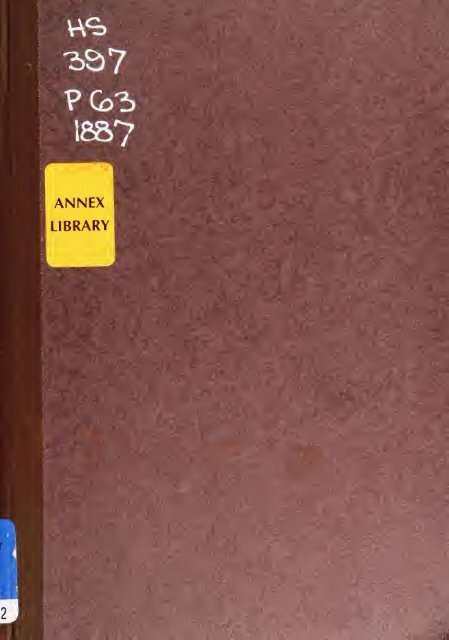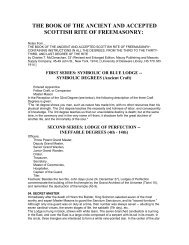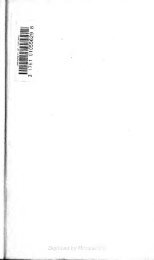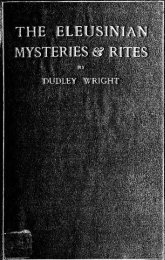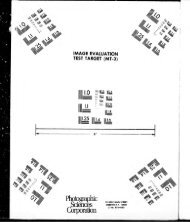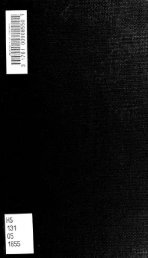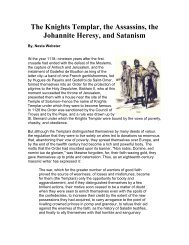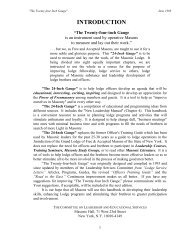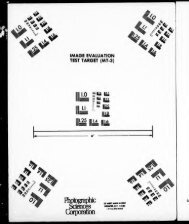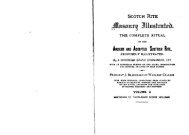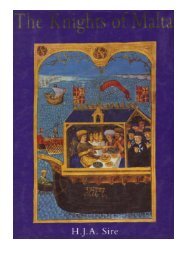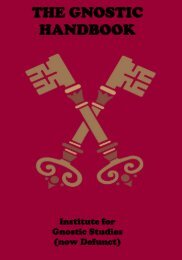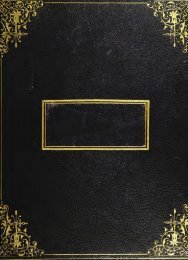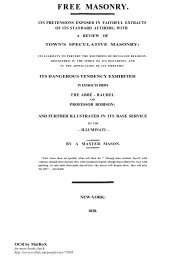Masonic Origines (1887) - The Masonic Trowel
Masonic Origines (1887) - The Masonic Trowel
Masonic Origines (1887) - The Masonic Trowel
Create successful ePaper yourself
Turn your PDF publications into a flip-book with our unique Google optimized e-Paper software.
<strong>1887</strong>
CORNELL<br />
UNIVERSITY<br />
LIBRARY
MASONIC ORIGINES,<br />
BY<br />
ALBERT PIKE.<br />
Published by the Supreme Council of the 33d Degree,<br />
for the Southern Jurisdiction of the<br />
United States.<br />
Second Edition.<br />
WASHINGTON<br />
<strong>1887</strong>.<br />
:
311<br />
i^t^a.
MASONIC ORIGINES.<br />
A <strong>Masonic</strong> Degree is a rank and dignity with which one is, by<br />
legal authority, invested ; the investiture consisting in a ceremony<br />
of initiation or reception, longer or shorter, scenic, spectacular,<br />
or instructive, or with scenic pomp, and instruction intermingled<br />
in administering to him certain vows or obligations ; and in the<br />
putting him in possession of certain modes of recognition, con-<br />
sisting generally of signs, words, and grips or 'tokens'.<br />
A 'Kite' is an aggregation and succession of any number of<br />
Degrees, given by one or more Bodies, but always by the author-<br />
ity of a single Supreme Government.<br />
Of most of the Degrees styled ' <strong>Masonic</strong>,' the time and the<br />
manner of origin are unknown to us. <strong>The</strong>y have either been<br />
made by individuals, who were their authors and composers,<br />
or by Committees of Bodies. <strong>The</strong> earliest were undoubtedly<br />
framed and set on foot by individuals, themselves makers of them,<br />
or for whom they were made by others.<br />
Except the first possessor or possessors, no one can ever obtain<br />
legal investiture with any Degree, unless by receiving it from<br />
him or them, or from a person or persons or a Body, having power<br />
derived from him or them, and so as if immediately from him or<br />
them; by assuming the required vows or obligations; and by<br />
being, as if by such first possessor or possessors, entrusted with<br />
the arcana or modes of recognition, and the oral explanations of<br />
the Symbols employed.<br />
A Rite might consist of a single Degree ; but whether of one<br />
or more, the first possessor or possessors of the Degree or System,<br />
or his or their successors, have the right to make or to adopt Con-<br />
stitutions, Institutes, Statutes, or Regulations, which shall be the<br />
;
Organic or Supreme Law of the Degree or Rite, providing a<br />
system of government for it and for its administration ;<br />
providing<br />
for the creation of Bodies, for fees, dues and revenues, and for<br />
a judicial system ;<br />
with other legislation needed for its successful<br />
propagation and well-being. By this legislation every one already<br />
of, or afterwards becoming a member of the Rite, is bound,<br />
being in law a party to it and one of the makers of it ; and no<br />
man can be of the Degree or Rite, and repudiate or set at<br />
nought its fundamental law. If he does that, he cuts himself<br />
off from it.<br />
However, wherever and whenever drafted or made, such Con-<br />
stitutions, Institutes, &c., become the law of the Rite by being<br />
adopted by the first possessors of it; and this adoption makes<br />
them none the less obligatory, even if their real origin be mythical,<br />
or if they purport untruly to have had a more ancient and special<br />
origin.<br />
For, as no one can ever be lawfully invested with the Degree<br />
or Degrees of the Rite, without swearing allegiance to its Supreme<br />
Power and obedience to these Constitutions, no one claiming to<br />
be so invested can ever be at liberty to deny their authenticity<br />
or impeach them.<br />
And, evidently, no one can ever claim any rights or powers,<br />
titles or dignities, created by such Constitutions or provided for<br />
by them only, if he denies their authenticity. To do so is simply<br />
cheatery; in French, mpercherie; cozenage, rascality.<br />
Degrees and Rites have been invented and created as the means<br />
of organization of associations for various purposes ; for mutual<br />
assistance and relief ; for the prosecution of special studies; for<br />
the purposes of social, political or religious reforms; or merely<br />
for notoriety, show, pomp, and to obtain for their possessors a<br />
factitious dignity and supposititious self-importance; and even<br />
for mere jollification and vulgar burlesque.<br />
<strong>The</strong> benefits intended to be so secured cannot rightfully belong<br />
to any person except those who, paying the prices for the Degree<br />
or Degrees fixed by the law of the Degree or Rite, have received<br />
It or them at the hands or by the authorization of a lawful and<br />
legitimate Body or Ofiicer of the Rite, having the supreme power<br />
derived from the first possessors; and except those who, by<br />
assuming the required obligations, have become entitled to, and<br />
have been put in possession of, the arcana and modes of recogni-
tion—belonging to each Degree. To endeavor to procure for<br />
one's self those benefits, whether pecuniary, or of consideration<br />
and dignity, or of relief or assistance, in any other way, is plain<br />
dishonesty and peculation : and for any one not legally in pos-<br />
session of Degrees to take money for conferring them, is the<br />
obtaining of money under false pretences. One who does it<br />
is well styled in French an escroe.<br />
No Body can possess or own Degrees, nor get title, (as the<br />
Grand Orient of France used to pretend to do,) by purchase<br />
and cession, of Degrees, if it be composed wholly or in part of<br />
persons who have not been invested with them ; nor can continue<br />
to be owners or possessors of Degrees which it rejects, repudiates,<br />
and refuses to work, or forbids its subordinate Bodies to work.<br />
Those who are only invested with a lower Degree cannot confer<br />
upon others a higher one. A Body of Apprentices cannot make<br />
Fellow-Crafts, nor a Body of Fellow-Crafts make Master-Masons,<br />
nor could Cemeau's Consistory of 32d8 make 33ds. It needs no<br />
argument to prove that no one can give a Degree to another,<br />
unless he has it himself.<br />
Nor can a Body, wholly or in part composed of Master-Masons,<br />
legislate for or control Bodies of Eoyal-Arch Masons, or those of<br />
the higher Degrees of another or the same Rite.<br />
<strong>The</strong>se are self-evident axioms, and fundamental principles of<br />
<strong>Masonic</strong> Law and of common sense. Keep them in mind.<br />
<strong>The</strong> primary or earliest Rite of Free-Masonry was the Sym-<br />
bolic, commonly known as the 'Blue' Masonry, consisting at first<br />
of no 'Degrees,' properly so called. When the First or Second<br />
Degree was invented and adopted, or by whom or how, is not<br />
known. It is only known that until about a certain date there<br />
were no Degrees, and that abovi 1723,. perhaps as late as 1725,<br />
the Third was adopted. <strong>The</strong> three were invented and came into<br />
use before there was any other organization than that of the<br />
Blue Lodges. <strong>The</strong> Third Degree, at least, belonged to the<br />
English Free-Masonry, and could be legally acquired from it<br />
only.<br />
In regard to the fundamental law of the English Masonry, as<br />
embodied in what are known as Anderson's "Constitutions of the<br />
Free-Masons," they were first published at London in 1723, " con-<br />
taining the History, Charges, Regulations, &c., of that Most
Ancient and Eight Worshipful Fraternity," dedicated by J. F.<br />
Desaguliers, Deputy of the Duke of Wharton, Right Worshipful<br />
Grand Master, to the Duke of Montagu, Ex-Grand Master.<br />
<strong>The</strong> whole purported to be " collected from their general rec-<br />
ords, and their faithful traditions of many ages." <strong>The</strong> History<br />
stated that King Athelstan (about A. D. 930) " encourag'd<br />
many Masons from France," who " brought with them the Charges<br />
and Regulations of the Lodges preserv'd since the Roman times,<br />
who also prevail'd with the King to improve the Constitution of<br />
the .English Lodges according to the foreign model :" and that<br />
"Prince Edwin, the said King's youngest son, summoned all the<br />
Masons in the Realm to meet him in a Congregation at York,<br />
who came and composed a General Lodge, of which he was<br />
Grand Master; and having brought with them all the writings<br />
and records extant, some in Greek, some in Latin, some in<br />
French, and other languages, from the contents thereof that<br />
Assembly did frame the Constitution and Charges of an English<br />
Lodge." Also, " that those Charges and Laws of Free-Masons<br />
have been seen and perused by our late Sovereign, King Henry<br />
VL, and by the Lords of his honorable Council, who haveallow'd<br />
them, and said that they be right good and reasonable to be<br />
holden, as they have been drawn out and collected from the<br />
records of ancient times."<br />
<strong>The</strong> "Charges" are thus intituled: "<strong>The</strong> Charges of a Free-<br />
Mason, extracted from the ancient records of Lodges beyond sea, and<br />
of those in England, Scotland and Ireland, for the use of the<br />
Lodges in London."<br />
And the Regulations: "General Regulations, compiled first<br />
by Mr. George Payne, Anno 1720, when he was Grand Master,<br />
and approved by the Grand Lodge on St. John Baptist's Day,<br />
Anno 1721," &c " and now by the command of our<br />
said Right Worshipful Grand Master Montagu, the author of this<br />
book has compar'd them with and reduc'd them to the Ancient<br />
Records and immemorial usages of the Fraternity, and digested<br />
them into this new method, with several proper explications, for<br />
the use of the Lodges in and about London and Westminster."<br />
In Article 39 of these Regulations it is stated that the approval<br />
and consent of the majority of all the Brethren present must be<br />
" solemnly desir'd " to make new Regulations binding, " as it was<br />
desir'd and obtain'd for these Regulations, when propos'd by the
Grand Lodge, to about 150 Brethren, on St. John Baptist's Day,<br />
1721."<br />
<strong>The</strong> "approbation" of the whole, by the Grand Master, Deputy<br />
Grand Master and Grand Wardens, and the Masters and<br />
Wardens of twenty particular Lodges, (among whom was '<br />
' XVII.<br />
James Anderson, A. M. , the author of this Book, Master,")<br />
recited, that the Free-Masons of England had twice thought it<br />
necessary to correct their Constitutions, Charges and Eegulations<br />
first, in the reign of King Athelstan, the Saxon, and, long after,<br />
in the reign of King Edward IV., the Norman: that the old<br />
Constitutions in England had been much interpolated, mangled,<br />
and miserably corrupted : that the late Grand Master, the Duke<br />
of Montagu, had " order'd the author to peruse, correct and<br />
digest, into a new and better method, the History, Charges and<br />
Regulations of the Ancient Fraternity ;<br />
" and that he had, ac-<br />
cordingly, "examin'd several copies from Italy and Scotland, and<br />
sundry parts of England, and from thence, (tho' in many things<br />
erroneous,) and from several other ancient Records of Masons," he<br />
had "drawn forth the above written new Constitutions, with the<br />
Charges and General Regulations."<br />
Every one now knows that no such " History, Charges and<br />
Regulations" had come from Italy ; that the Charges were not<br />
"extracted from the Ancient Records of Lodges beyond Seas,"<br />
because there were no other such Lodges ; that the whole account<br />
of Constitutions adopted by a Grand Lodge at York, of which<br />
Prince Edwin was Grand Master, and of the adoption of Consti-<br />
tutions in the times of Henry VI. and of Edward IV. , was fabu-<br />
lous. No one knows anything about the real origines of the<br />
Charges or Regulations, except that the former, at least, were<br />
known and used in Scotland before they were in England ; and,<br />
in short, it is no longer denied that the whole account of the sources<br />
from which both were derived is a fiction,—in plain words, an<br />
impudent congeries of lies.<br />
But being ' drawn out ' by Anderson, they were adopted by<br />
the Grand Lodge, and by that became obligatory, being in no<br />
wise vitiated by the false statements as to the antiquity of the<br />
sources from which they were derived, any more than the laws<br />
of Numa Pompilius were, because, to give them greater sanctity,<br />
he pretended that they were dictated to him by the Nymph<br />
Egeria ; or those of Minos, who claimed for them a divine origin.<br />
; ,
<strong>The</strong> m-igines of Nations and of ancient Churches, Societies and<br />
Associations are alike enshrouded in the obscurity of the Past.<br />
What is really known in regard to the origin of Kome ? Nothing.<br />
Niebuhr long ago exploded the accepted fictions in regard to<br />
Romulus and Remus. What is known as to the origin and the<br />
adoption tof statutes and rules by any one of all the many Guilds<br />
of England ? Nothing. And so nothing is known as to the real<br />
origin of the Constitutions of Symbolic Masonry. Who knows<br />
by what authority the ' Ancient Landmarks ' were established ?<br />
No one. History and tradition are alike mute on the subject.<br />
<strong>The</strong> next Rite that made its appearance in Masonry was that<br />
of Perfection or H6r6dom, in France, composed of the Blue<br />
Degrees and 22 others, the 18th being the ' Rose Croix,' and the<br />
25th the ' Prince of the Royal Secret.' Of the authors or origins,<br />
or separate working, before the organization of the Rite, of any<br />
except two or three of the twenty-two Degrees, no information<br />
whatever has come down to us ; and little reliance is to be placed<br />
on what has been told in regard to even those two or three. <strong>The</strong><br />
twenty-five Degrees had. been organized into a Rite before 1762.<br />
One by one they had been invented, worked, communicated by<br />
the inventors to others, and at last, how and by whom nobody<br />
knows, had been arranged and aggregated into a system, called<br />
a Rite, which afterwards appeared before the world, and then or<br />
at a later time had Regulations purpmiing to have been framed<br />
by nine Commissioners, assembled at Berlin or Bordeaux in 1762.<br />
Whether there ever was any such assembly ; whether, if there<br />
was, it met in 1762, and at which place ; who the Commissioners<br />
were, how appointed and empowered ; and how, when, where<br />
and by what Body these Regulations were adopted, nothing whatever<br />
is or ever has been known.<br />
But tJw Rite was an actuality. It certainly existed before 1762,<br />
and continued to exist, accepting these Regulations as the law of<br />
its being ; and no man has, since 1762, become a regular and<br />
lawful Mason of that Rite, except under the authority of those<br />
Regulations; which, if they were made in 1762, existed in manu-<br />
script only for seventy years, before being for the first time<br />
printed and published at Paris in 1832. I have manuscript<br />
Rituals of it as old as the beginning of the present century. <strong>The</strong><br />
Rite belonged to those who invented it and set it to work: they
had the right to adopt regulations for it, and they and their suc-<br />
cessors alone had and have the power to confer its Degrees<br />
Degrees of that Rite.<br />
<strong>The</strong> Grand Orient of France took the 18th of that Rite, the<br />
Rose Croix, made three others out of some of its Degrees below<br />
the 18th, added these four to the Blue Degrees, and so created<br />
the French Rite or Bit Modeme. It was the inventor and maker<br />
of that Rite, and, as such, had the exclusive right to propagate,<br />
administer, and govern it. Nobody has ever disputed that.<br />
<strong>The</strong> Templar Degree made its appearance in England, brought,<br />
it is supposed, from France, and worked in England as the first<br />
of seven Degrees, of which the 7th was the Kadosh. All these<br />
were given by the Blue Lodges. In Scotland, one Lodge would<br />
sell to another, for a pound or two, the right to confer the Tem-<br />
plar Degree. In England, the Lodges conferred it, and afterwards<br />
the falsely called ' Grand ' Lodge at York chartered an Encampment<br />
at Manchester, composed of artizaus, which conferred the<br />
Templar Degree for seven and sixpence. <strong>The</strong>n Dunckerly took<br />
possession of it, assumed to be its Chief, and made it an 'Order,'<br />
with a new organization. Who knows any thing about the origin<br />
of the Degree, by whom and when and where it was invented and<br />
first worked ? No man on earth. It is supposed to have originated<br />
in France ; but no one knows that, nor has any one ever seen a<br />
French Ritual of a Templar Degree like ours or like the English<br />
Degree ; nor is such a Degree spoken of, as ever having existed<br />
in France, by any French <strong>Masonic</strong> writer.<br />
Certain persons established an Encampment in Pennsylvania.<br />
By what authority, who they were, where they were invested<br />
with the Degree, by what Ritual they worked, no body knows or<br />
ever will know. <strong>The</strong>n Encampments appeared in New England.<br />
Where the makers of them were invested with the Degree, or<br />
whether they had it at all, no one knows ; but as they adopted a<br />
ceremony totally different from those of the English, Scottish,<br />
and Irish Encampments, the presumption is that they had never<br />
been legally invested with the Degree by the rightful possessors<br />
of it ; because, if they had, they would have been furnished<br />
with Rituals whereby to establish Bodies, and would have had no<br />
power or right to reject these and make new ones for themselves,<br />
with nothing whatever in them that even savours of or remotely<br />
resembles the ancient real Templar ceremony of reception into<br />
2<br />
—<br />
as
10<br />
the Order, or the present Ritual of any foreign Teraplarism, how-<br />
ever creditable the American Ritual may be to the inventor of it.<br />
So the Royal Arch Degree appeared in England, no body<br />
knows at what date, or by whom invented. <strong>The</strong> Degree of Mark<br />
Master appeared also, when, by whom made or introduced, no<br />
one knows. In England there grew up Chapters of Royal Arch<br />
and Mark Lodges,—Mark Masonry and Royal Arch Masonry<br />
having no connection there with each other.<br />
But in the West Indies, before 1795, the Mark Master, Past<br />
Master, and Royal Arch Degrees, were worked in the Island of<br />
Santo Domingo, as composing one system, with Rituals trans-<br />
lated from the English ; and it was required that a person should<br />
have the Royal Master and Super-Excellent Master Degrees be-<br />
fore he could receive the Royal Arch. <strong>The</strong> Degree of Master<br />
Mark Mason, with a Ritual totally different from the West Indian<br />
one, and totally different from our present one, was about the<br />
same time worked at Charleston : and<br />
by and by the Degree of<br />
Select Master appeared and was given with that of Royal Master.<br />
Who knows the origin or author or time of origin of the Mark<br />
Master or Master Mark Mason Degree ; of the Past Master De-<br />
gree ; of the English Royal Arch ; of the Royal Master ; of the<br />
Select Master; of the Super-Excellent Master? No one. But<br />
Bodies of these Degrees were organized : a Rite consisting of the<br />
Mark Master, Past Master, Most Excellent Master, (known to<br />
have been made in the United States,) and Royal Arch, was or-<br />
ganized, with Chapters, Grand Chapters of States, and a General<br />
Grand Chapter of the United States ; and a Rite consisting of<br />
the Royal and Select Master, and in some States of the Supers<br />
Excellent Master Degrees, was also organized, with Councils,<br />
Grand Councils, and, finally, and very lately, a National Grand<br />
Council.<br />
And those who had possession of the Templar Degree in New<br />
England made the Red Cross Degree out of two Degrees of the<br />
Rite of Perfection, and organized it and the Templar Degree<br />
into another Rite, with Encampments or Commanderies, Grand<br />
Encampments or Grand Commanderies, and a Grand Encampment<br />
of the United States.<br />
Who knows anything in regard to the origin of the two Degrees<br />
out of which the Red Cross was made ? No one. When,<br />
how, by whom they were made, no one knows.
11<br />
But, to one thing all agree : that to the Bodies of each of these<br />
Rites, the Rite as orgauized, and as administered by them, exclusively<br />
belongs ; and if the Degrees of either are given by any<br />
other authority, the recipient is a spurious Royal Arch, a spurious<br />
Templar, a spurious Select Master; and that any one who, not<br />
being regularly invested with either of the Degrees, should un-<br />
dertake to give it, and establish Bodies of it, would be a fraudu-<br />
lent impostor and a knave, no better than a sneak-thief.<br />
And though a Negro Lodge, Chapter, or Commandery may<br />
give precisely the same Degrees in all respects, by identically the<br />
regular Rituals, one so receiving either is held, every where in<br />
the United States, to be no Master Mason, no Royal Arch Mason,<br />
no Knight Templar, not having the Degrees from the legitimate<br />
authority.<br />
In 1801 another <strong>Masonic</strong> Rite made its appearance at Charlesr<br />
ton, in South Carolina, composed of the 25 Degrees of the Rite<br />
of Perfection, and eight others added to them, and claiming to<br />
have been organized at Berlin in 1786. It had, in manuscript,<br />
its Grand Constitutions written in French, purporting to have<br />
been made at Berlin, in Prussia, in a Supreme Council of the<br />
33d Degree, duly and legally established and constituted there<br />
on the 1st of May, 1786, at which Council was present the King<br />
of Prussia, Frederic the Great, Sovereign Grand Commander.<br />
In 1802, the Supreme Council of the 83d Degree for the United<br />
States of America announced to the world, by formal manifesto,<br />
its establishment on the 31st of May, 1801. Since then it has<br />
had continuous existence under its Constitutions to the present<br />
day, with periods of inactivity ; sometimes, perhaps, with na<br />
subordinate Bodies, never with many, until after 1855. All this<br />
was but natural for such a Body, Supreme Power of such a Rite,<br />
and in such a country, which, having a special Masonry of its<br />
own, regarded the Ancient and Accepted Scottish Rite as intru-<br />
sive. It has never had less than three members, and was but<br />
once, sixty and more years ago, reduced to that; and, by its or-<br />
ganic law, three constitute a Supreme Council, as three Master-<br />
Masons constitute a Lodge.<br />
In 1814, it created the Supreme Council for the Northern<br />
Jurisdiction of the United States at New York, and itself took<br />
the title of the Supreme Council for the Southern Jurisdiction.
12<br />
<strong>The</strong>re are now some twenty-four Supreme Councils of this Rite<br />
iu the world, all of which, with the exception of two or three,<br />
have been created by authority, either immediate or transmitted,<br />
from that established at Charleston in 1801. It is more widely<br />
diffused than any other Rite of Masonry in the world, and, in its<br />
higher Degrees, many times more so than either the Royal Arch<br />
or Templar Rite, which are confined to English-speaking countries<br />
and the two Supreme Councils of the United States have of their<br />
Obedience over two hundred different Bodies.<br />
By the same law that obtains as to the other Rites, this Rite<br />
belonged to those who formed, organized and established it.<br />
Whether its Constitutions were framed and adopted at Berlin or<br />
not, they were valid as its fundamental law, because they were<br />
accepted, adopted and promulgated as such law in 1801.<br />
This Rite was and is called the Ancient and Accepted Scottish<br />
Rite; and no oiher Rite under that name or with all the same<br />
Degrees has ever made its appearance. No man has ever regu-<br />
larly received its Degrees, since the adoption of the Constitutions,<br />
without swearing to obey them as the supreme law of the Rite<br />
and it is not possible that a Body of any Degree can be a Body<br />
of this Rite, if it denies the authority of its Grand Constitutions.<br />
<strong>The</strong> Rite exists and is active, with its Organic Law* and its<br />
Governing Bodies, precisely as the other Rites exist and are<br />
active : and its origin and the origin of its Constitutions, like the<br />
origin of all other Rites, is not historically known to us with<br />
certainty. If there was a Supreme Council at Berlin, no record<br />
of its sessions remains. If there were written minutes of those<br />
of the Supreme Council at Charleston for half a century, they<br />
have been destroyed or lost. <strong>The</strong>re was not anciently any law<br />
that required the minutes of a Body to be recorded in books<br />
and they were universally kept on loose sheets or paper-rolls,<br />
when kept at all.<br />
So the early records or minutes of Templarism in England,<br />
the 'records' of the 'immemorial Encampments,' if they kept<br />
any, have utterly disappeared, like those of the Bodies of the<br />
Rite of Perfection in France, and those of the old Blue Lodges<br />
in France and England, Scotland and Ireland. No man of this<br />
or the last generation has seen the minutes of any of these early<br />
Lodges, of the Grand Lodge of France for a score or two of years<br />
after its establishment, of any Encampment of Templars before<br />
; : ;
13<br />
the time of Dunckerly. I have been endeavouring in vain to<br />
find the minutes of the proceedings of the Grand Orient of<br />
France, from 1807 to 1815. When did the Grand Lodge of<br />
England begin to keep its minutes? and who has seen those<br />
from 1717 to 1723? Where are the oldest minutes of "the old<br />
Grand Lodge at York? " Who has seen the earliest minutes of<br />
Dermott's Grand Lodge? Where is the book that contains the<br />
record of its sessions during the first years of its existence? <strong>The</strong><br />
keeping of formal records was not an essential characteristic of<br />
Masonry in the old days ; and the ancient history of Blue Masonry<br />
is, therefore, more mythical than that of Etruria or Rome.<br />
Fortunately, it is no longer considered necessary to resort to<br />
fictions, impudent and ridiculous, to support the claim to legitimacy<br />
of any Degree or Rite of Free-Masonry. Nothing, in re-<br />
ligion or history or mythology, has ever equalled the riotous<br />
exuberance of fiction in which the earlier <strong>Masonic</strong> writers in<br />
England revelled, in regard to the Blue or Symbolic Masonry;<br />
and multitudes of Masons religiously believe these impudent<br />
fictions yet. <strong>The</strong>y sufficed at the time when they were invented,<br />
but they are unnecessary and exploded now.<br />
One Joseph Cemeau came, in 1806 or 1807, from the Island of<br />
Cuba to New York, which was within the Jurisdiction of the<br />
Supreme Council of the United States at Charleston. He was<br />
a Prince of the Royal Secret, of the 25th Degree of the Rite of<br />
Perfection, made such in 1806, at Baracoa in Cuba, and also<br />
made Deputy Inspector for the northern part of that Island, by<br />
Mathieu Dupotet, an Inspector of the Rite of Perfection, by au-<br />
thority transmitted from Etienne Morin ; and he was no more.<br />
It is admitted by his Historiographer, Folger, that he did not, at<br />
first, pretend to have been invested with any other Degrees than<br />
the twenty-five of the Rite of Perfection. Afterwards he falsely<br />
pretended to have the additional Degrees of the Ancient and<br />
Accepted Scottish Rite, and the Templar Degree, and he<br />
trafficked in all, and in one called 'Aaron's Band,' and so plyed<br />
a somewhat profitable trade in these shoddy and bogus com-<br />
modities. Whatever he may or may not have been, and whatever<br />
'authority or commission or inherent prerogative he may<br />
have had, he invaded the jurisdiction of a lawful and regular<br />
Supreme Council of the United States, was a trespasser, intruder<br />
and interloper, a disturber of the <strong>Masonic</strong> peace, without the
14<br />
slightest power to give a Degree or establish a Body of the An-<br />
cient and Accepted Scottish Rite. All that he did was, on that<br />
ground alone, merely null and void.<br />
This person established in New York, without any authority<br />
to do so, even under his Patent from Dupotet, a "Sovereign<br />
Grand Consistory" of Princes of the Eoyal Secret, of the 25th<br />
Degree, of the Ancient and Primitive Rite of Heredom, but<br />
calling it of the 32d, whose members from time to time se-<br />
lected some of themselves and rewarded them with what they<br />
called the 33d Degree, which gave them no powers, but was a<br />
mere naked decoration, and therefore not the 83d Degree estab-<br />
lished by the Grand Constitutions of the Ancient and Accepted<br />
Scottish Rite; and these 33ds, so made, were in the aggregate<br />
styled a Supreme Council, a merely ornamental group, which<br />
had no powers at all ;<br />
all powers of government and administra-<br />
tion, of legislation and judicial decision, belonging to the Princes<br />
of the Royal Secret in Grand Consistory.<br />
All the 32ds in the world could not make a 33d of the Ancient<br />
and Accepted Scottish Rite. Nor could there be a Supreme<br />
Council of that Rite without powers, a mere nominis umbra.<br />
And if Cerneau had actually been a 33d and had had power<br />
to create a Supreme Council, his action, investing a Grand Con-<br />
sistory with supreme powers, and providing for a nominal -Su-<br />
•<br />
preme Council with none, would have been utterly irregular, in<br />
gross violation of the Constitutions of the Rite, and absolutely<br />
null and void.<br />
Undoubtedly, if he had had competent authority, he could<br />
have established Bodies of the Rite of Perfection in twenty-five<br />
Degrees in New York, and the Supreme Council at Charleston<br />
could have had nothing to say against it ; for its Rite had not<br />
swallowed or extinguished that of Perfection, nor obtained any<br />
exclusive title to its twenty-five Degrees. But the whole of<br />
Cerneau's action was a mere impudent inposture and fraud.<br />
Nothing could have been more brazenly fraudulent than his<br />
styling the Degree of Prince of the Royal Secret of the Rite of<br />
Heredom or Perfection, the 'Thirty-second' Degree; for that Rite<br />
consisted of twenty-five Degrees and no more ; and he never had<br />
any Thirty-second Degree, or any other Degree above the 25th<br />
of that Rite. He was simply an audacious knave and impostor,<br />
earning money by dealing in stolen wares under false pretences ;.
15<br />
as he was in giving the Degree of Knight Templar, which also<br />
he never Had. It is now boldly asserted that he had a commis-<br />
sion from the Grand Orient of France, which is an audacious<br />
lie; for no man has ever seen such a commission; and he covM<br />
not have had one, because, until 1815, the Grand Orient of<br />
France never controlled the Degrees above the 18th.<br />
Undoubtedly, he might have made himself the author of a<br />
new Rite, by inventing or procuring some one to invent for him<br />
eight Degrees, in addition to those possessed by him, and calling<br />
the last the 33d, and making a Body of it the Supreme Power<br />
of the Rite.<br />
But he could neither appropriate the names borne by Degrees<br />
of the same numbers, in the Ancient and Accepted Rite, nor<br />
claim and pretend that the Degrees of his invention were identi-<br />
cal with those; nor give to his Rite the name of " Ancient and<br />
Accepted Scottish Rite," nor pretend and claim that it was the<br />
same as that practiced by the Supreme Councils at Charleston,<br />
of France, and others, under the Grand Constitutions purporting<br />
to have been made in 1786, without being guilty of imposture<br />
and rascality, and of obtaining money under false pretences.<br />
All such performances are what in the French language are styled<br />
escroquerie'and frvprnnerie.<br />
When any Rite has become established, those who obtain its<br />
Degrees pay for them, sometimes very considerable sums. By<br />
being invested with these Degrees, by the possession of the means<br />
of recognition, (only to be honestly obtained by paying for them,<br />
and only by paying the person or Body entitled by the Cotistitutions<br />
of the Rite to receive the fee,) and by becoming a member<br />
of the Order, Society, or Association, a person obtains valuable<br />
rights and privileges,—the right to be defended in danger and<br />
aided in adversity, the privilege of finding Brothers wherever<br />
the Order exists, a joint ownership in the property of the Lodge<br />
or other Body to which he belongs, titles and decorations which,<br />
if he pays for them and obtains them honestly, he has a right to<br />
be proud of, and the right to letters, if he travels, making him<br />
favourably known to distinguished persons in other countries.<br />
Now, if any one not legally invested with the Degrees of the<br />
Rite or Order, and having no authority derived from the founders<br />
to give its Degrees and establish Bodies of it, comes into its Juris-<br />
diction and gives what are, or what he pretends are, its Degrees,
16<br />
and establishes Bodies of it, the persons invested with his gewgaws<br />
are not lawfully in possession of them, and the bodies that<br />
he creates are spurious, and he is a rogue, even worse than a<br />
thief, for so obtaining money by false pretences and selling what<br />
does not belong to him—a knave of the scurviest sort ; a poor,<br />
contemptible, impudent impostor and sharper.<br />
One can scarcely conceive of a more disreputable or dirty<br />
occupation. <strong>The</strong> pretended authority of the bilk who practices<br />
it rests on lies. He must sustain himself by continual lying,<br />
entrap the unwary by lying, make decent men parties to fraud<br />
by lying, sell his stolen or shoddy wares by the aid of lies, must<br />
lie from the rising of the suu until the going down thereof, must<br />
live in an atmosphere of lies, be saturated with mendacity, be-<br />
come a walking fraud, filch money from men's pockets by lies,<br />
cheat, cozen, pilfer by lies, and be equally without conscience or<br />
shame.<br />
"Lafowrherie ajouie h, malignite au memonge."<br />
If the axioms, which need no demonstration, that Degrees<br />
belong to those who make, compose, or compile them, and who<br />
do not sell or abandon their right of proprietorship over them,<br />
and that Rites belong to those who organize and establish them,<br />
and are the first workers of them, were not true, or could be<br />
changed into lies, or cease to govern in Masonry, there would no<br />
longer be any clandestine or irregular Masons, or spurious Bodies,<br />
or any <strong>Masonic</strong> legitimacy : a man receiving the Blue Degrees<br />
in a Negro Lodge, or by reading a book, would be as good a<br />
Mason as anyone; and anybody who pleased could give Degrees<br />
and establish Lodges and Grand Lodges, Chapters, Comman-<br />
deries, Councils and Consistories; and all Masonry would be<br />
destroyed.<br />
For, when an Apprentice is asked, what makes him a Mason,<br />
he answers, "My obligation ;" and if a man who never took the<br />
obligation of a Degree to the real owner and lawful possessor of<br />
it, still has the Degree and can give it and create Bodies of it,<br />
the whole bottom of Masonry has dropped out. If he actually,<br />
but surreptitiously, has obtained a knowledge of the whole Ritual<br />
of the Degree, it is a baser act on his part to use for profit what<br />
has been basely obtained, than it is to make a Degree and repre-<br />
sent it to be and sell it for a regular Degree of a regular Rite,
17<br />
when it is not that at all. For, in the latter case, he only steals<br />
the name of the Degree ; and, in the former, he steals that and<br />
the substance of it together.<br />
It is time that some things should be called by the right names.<br />
<strong>The</strong>ft is nothing less than theft, whatever it be that a man steals.<br />
<strong>The</strong> man who, without having lawful and regular investiture<br />
with a Degree, claims to possess it, is an impostor, and, there-<br />
fore, a knave. For him to give it for money, is cozenage : to<br />
establish spurious or irregular Bodies is sheer rascality : and for<br />
men not ignorant and misled, to endeavour to get the right to<br />
enjoy the benefits and privileges, of any Eite, for sums far smaller<br />
than those pay who obtain it at the hands of regular Bodies, and<br />
without taking the proper obligations to the regular possessors,<br />
hoping thereby to share in what is not their own, is dishonesty<br />
and indecency.<br />
Bro. •. William J. Hughan, of Torquay in England, has noticed<br />
in the London Free-Mason the pamphlet. "<strong>Masonic</strong> <strong>Origines</strong>." I<br />
am indebted to him for pointing out an error into which I had<br />
fallen, which I have corrected in this edition.<br />
I copy the followiug paragraph from his notice<br />
"He asks (1), 'when did the Grand Lodge of England begin<br />
to keep its n)inutes?' I reply, from 1723; and their chief records<br />
are to be found in the History of Free-Masonry, by Bro.-. Gould,<br />
being copies of the Original records still preserved at Free-Masons'<br />
Hall, which many of us have seen and handled."<br />
No doubt; but the Grand Lodge was established in 1716,<br />
and what I was commenting on was the<br />
according to Anderson ;<br />
absence of records or minutes of the organization of Bodies, of<br />
their 'origines,' and of their earliest proceedings. None at all are<br />
to be found of the mganizatim of the Grand Lodge of England,<br />
in the shape of authenticated minutes; and we have no record of what<br />
it did for six or seven years.<br />
Speaking of " the great <strong>Masonic</strong> event of the eighteenth cent-<br />
uj.y,_the Assembly of 1717,<br />
—<br />
out of which sprang the Grand Lodge<br />
of England, the Mother of Grand Lodges," Bro.-. Gould says:<br />
:
18<br />
" UnfortunaMy, the mimites of Grand Lodge only commence on June<br />
24, 1723.<br />
"For the history, therefore, of the first six years of the new<br />
regvme, we are mainly dependent on the account given by Dr.<br />
Anderson in the ' Constitutions' of 1738, nothing whatever relating<br />
to the proceedings of the Grand Lodge, except the ' General Regulations'<br />
of 1121, having been inserted in the earlier edition of 1723." 4<br />
GoiM, 279.<br />
Anderson says that after the rebellion was over in 1716, the<br />
four old Lodges (which had no names or numbers, being desig-<br />
nated only by the ale-houses or taverns where they met), with<br />
some old Brothers, met at the Apple Tree Tavern, and "constituted<br />
themselves a Grand Lodge ^ro tempore in due form," and<br />
"revived the Quarterly Communication of the officers of Lodges<br />
(cail'd the Grand Lodge)," and resolved to hold the Annual<br />
Assembly and Feast, and then to chuse a Grand Master from<br />
among themselves, until they should have the honour of a noble<br />
Brother at their head." 4 GouM, 279, 280. <strong>The</strong> date of this<br />
meeting is not given.<br />
But the Assembly and Feast (annual) were held afterwards,<br />
on St. John Baptist's day, 1717, at the Goose and Gridiron Ale-<br />
house, when Antony Sayer, Gentleman, was elected Grand Master<br />
of Masons, and Jacob Laraball, a Carpenter, «nd Captain Joseph<br />
Elliott, Grand Wardens. <strong>The</strong> Grand Master " commanded the<br />
Masters and Wardens of Lodges to meet the Grand Officers every<br />
quarter in communication." This was the Grand Lodge, which did<br />
not elect the Grand Master and Grand Wardens.<br />
George Payne was elected Grand Master of Masons, at the<br />
Assembly and Feast, 24 June, 1718, and a city Carpenter and a<br />
Stonecutter, Grand Wardens ; Desaguliers, at the Assembly and<br />
Feast, 24 June, 1719; and George Payne a second time, at those<br />
on 24 June, 1720.<br />
<strong>The</strong>n, at the Quarterly Communication, or Grand Lodge in<br />
ample form, on St. John Evangelist's day, 1720, the selection of<br />
the Grand Master was provided for, to be made by the Grand<br />
Lodge, on the nomination of the actual Grand Master; and the<br />
power of appointing the Deputy and the Grand Wardens was<br />
given to the Grand Master "according to antient custom, when<br />
noble Brothers were Grand Masters." 4 Gould, 281.<br />
<strong>The</strong>se statements and others that follow, in regard to the As-<br />
semblies and Feasts and the Grand Lodge, were published by
:<br />
19<br />
Anderson in 1738; and Gould admits "that the history of the<br />
Grand Lodge, from 1717 to 1723, as narrated by Anderson, is,<br />
to say the least, very unsatisfactorily attested." 4 Gmild, 292.<br />
And in a note he shows that the information which Anderson<br />
furnishes was derived from hearsay, as he was not affiliated in<br />
English Masonry until after the election as Grand Master of the<br />
Duke of Montagu, in 1721.<br />
I add here, as illustrating what I have said in regard to un-<br />
certainty as to the origins of Bodies, what Bro.'. Gould says in<br />
regard to two ancient Lodges, each older than the Grand Lodge<br />
of England<br />
"Between the years 1710 and 1748, the Alnwick records, ^<br />
not wholly wanting, contain at best very trivial entries." 4 Gould<br />
267.<br />
Do any minutes of it show anything in regard to its organiza-<br />
tion and first meeting ?<br />
"<strong>The</strong> earliest entry in the minute-book of Swalwell Lodge is<br />
of September 29, 1725."<br />
Does this, or anything afterwards, show anything in regard to<br />
its origin or early history ?<br />
But I have looked into Bro."- Gould's History for those " chief<br />
records" which are to be found therein, being "copies of the<br />
Original Records;" and this is what I have found<br />
<strong>The</strong> earliest proceedings recorded in the minutes of the Grand<br />
Lodge of England are of 24 June, 1723, given by Gould, Vol.<br />
IV, pp. 373-375. <strong>The</strong>re were present the Duke of Wharton,<br />
Grand Master, Dr. Desaguliers, Dep. . Gr. . Master, and the two<br />
Gr.'. Wardens.<br />
After the minutes of this meeting, those of the Quarterly<br />
Communication of November 25 are given. <strong>The</strong> two extracts<br />
cover three quarto pages. <strong>The</strong>n follows Anderson's statement of<br />
what was done on the day of that Quarterly Communication.<br />
<strong>The</strong>n are given certain questions settled on the 19th of Feb-<br />
ruary, 1724, and the 28th of April of the same year; and ex-<br />
tracts and quotations from the records or minutes of the following<br />
dates: November 21, 1724; May 20, 1725, and November 27,<br />
1725, each distinguished by its brevity; December 19, 1727, and<br />
St. John's Day, Christmas, same year—the former only naming<br />
the Lodges represented, and the latter being a resolution of 3|<br />
lines; November 26, 1728; August 28, 1730; December in the<br />
:
20<br />
same year; December 15, 1730; March 17, 1731, certain reso-<br />
lutions; June, 1731; December 13, 1733, two brief resolutions;<br />
February 24, 1735; March 31, 1735; with brief references and<br />
extracts down to March 25, 1754.<br />
Gould has perhaps extracted all that is of any importance<br />
from the early records ; and it is very certain that they contain<br />
nothing at all in regard to the origin and first organization of the<br />
Grand Lodge of England ; and that, if any minutes of its ses-<br />
sions for six or seven years were kept, which does not appear, they<br />
are lost.<br />
I hardly think that I can agree with my Brother Hughan, that<br />
"the chief records" of the Grand Lodge of England are given by<br />
Bro. •. Gould. He may have extracted all that he considered of<br />
Value historically; but he has not given us the records themselves.<br />
<strong>The</strong>re may be much in them that would be of very great value<br />
otherwise than historically, as showing the progress of innovation,<br />
as well in the way of depravation as of improvement. A great<br />
many shining lights in Masonry would be benefited by a larger<br />
knowledge of what the old Masonry really was.<br />
I have said to Brother Hughan that to refer Masons to the<br />
costly history of Bro.-. Gould for the minutes and records of the<br />
Grand Lodges is idle. Not one Mason in a thousand in the<br />
United States will ever even see the work ; and a smaller number<br />
will own it. I have asked him why such minutes as remain<br />
cannot be published, complete, entire, and just as they are, in such<br />
shape that they can be accessible at small cost to Masons gen-<br />
erally. I should prefer to judge for myself whether Brother<br />
Gould has given us the chief records or not. Let us go to the<br />
sources of history, and hear what the old Bodies themselves have<br />
said about their origins and doings.<br />
I do not understand that the few persons who ' revived ' Ma-<br />
sonry in England, in 1716 and 1717, had any commission to do<br />
so from the four old Lodges to which they belonged ; that these<br />
Lodges were working at all until afterwards ; and that the mak-<br />
ing of the Grand Lodge was the act of these Lodges as organized<br />
Bodies. Where is the proch verbal of the organization of the<br />
Grand Lodge? Nowhere. What if it did begin to record its<br />
doings in 1723? Do the minutes then commenced give any in-<br />
formation as to its originesi No. <strong>The</strong>se continue all in the<br />
clouds.
21<br />
<strong>The</strong> four old Lodges are only nominum umbrce, ' the shades of<br />
names.' <strong>The</strong>y are wholly impersonal to us. We know nothing<br />
of their previous life ; and the whole story sounds like a myth.<br />
Bro. . Hughan next says, quoting my words<br />
(2.) "Where were any minutes of the 'old Grand Lodge at<br />
York,' if there was such a Body?" "I reply," he says, "they<br />
are still at York, from the year 1712, as respects the old Lodge,<br />
and from 1725 as a Grand Lodge ; . . . and all from 1712<br />
to'1730, and others, are exactly reproduced in Gould's justly celebrated<br />
history."<br />
Let us see exactly what they are.<br />
<strong>The</strong>re is a roll of parchment in existence, containing minutes<br />
of "ajsriuafe Lodge," and occasionally of " a general Lodge" at<br />
York, the first entry being of March 19, 1712, and the last of<br />
May 4, 1730. Persons were "sworne and admitted" and "ad-<br />
mitted and sworne" "into the Honourable Society and Fraternity<br />
of Free-Masons, as well at a general Lodge, as at a private one."<br />
<strong>The</strong> first entry begins: "March the 19, 1712, at a private Lodge<br />
held at the house of James Boreham ;" and notes the swearing<br />
and admission of six persons, and nothing more. It is signed by<br />
"Geo. Bowes, Esq., Dep. President."<br />
Up to December 27, 1725, there are minutes of 19 private<br />
Lodges, one of ' a Lodge,' one of ' a new Lodge,' one of ' an adjournment<br />
of a Lodge,' two of ' general Lodges,' and two of ' St.<br />
John's Lodges,' which were general ones, as the ' new Lodge,' ' a<br />
Lodge,' and 'adjournment of a Lodge' were not. We thus have<br />
fmir general Lodges only, in more than thirteen years, and no<br />
' Orand Lodge' meniioned. And these brief minutes, as well as of<br />
the general Lodges as of the private ones, contain literally m)thing<br />
except mention of the swearing and admission of members. Most<br />
of the entries are not signed at all ; some of those of private<br />
Lodges are signed by George Bowes, Dep. President; one of a<br />
general Lodge by Sir Walter Hawksworth, President; and one<br />
of a St. John's Lodge by Charles Fairfax, Dep. President. 4<br />
GmM, 271/.<br />
On the 27th December, 1725, a minute shows that the<br />
:<br />
' Society'<br />
went in procession to Merchants' Hall, had the Grand Feast,<br />
and elected a Grand Master, Deputy, Wardens, Treasurer and<br />
Clerk. This is not signed by any one ; nor is any subsequent<br />
entry signed by any officer until that of June 24, 1729.
22<br />
<strong>The</strong>n follow thirteen entries of two lines each of the swearing<br />
and admission of members at private Lodges; one of June 24,<br />
1726, of like admission, at a general Lodge, and one of June 24,<br />
1729, of like admission, 'at St. John's Lodge held at y° Starr in<br />
Stonegate.' <strong>The</strong> last also records the election of a Grand Master,<br />
Deputy Grand Master and Grand Wardens, and the appointment<br />
the Lodge, and<br />
of a Committee ' to assist in regulating the state of<br />
redressing from time to time any inconveniences that may arise.''<br />
And the last entry is of May 4, 1730, at a private Lodge at<br />
Mr. Ceiling's, being the sign of y° White Swann in Petergate,<br />
York, at which it was ordered by the Dep. Masf then present,<br />
that if thenceforth any officer of the Lodge should be absent<br />
from the company at the monthly Lodges, he should be fined a<br />
shilling for each omission. This was signed by the Dep. Gr. Master,<br />
and the preceding entry by the newly elected Grand Master.<br />
On the 6th of July, 1726, there is an entry in regard to a<br />
person who had "presumed to call a Lodge and make Masons<br />
without the consent of the Grand Master or Deputy :" beginning<br />
"Whereas it has been certify" to me," and declaring that "I do,<br />
with the consent of the Grand Master, and the approbation of<br />
the whole Lodge," expel him from the Society : with provisions<br />
in regard to the other persons concerned in the irregularity, and<br />
for others who might in like manner afterwards offend. But<br />
who "I" was, does not appear.<br />
How the Grand Lodge was formed, and when, these minutes<br />
do not show. In fact, they do not contain the name "Grand<br />
Lodge." <strong>The</strong>y chronicle a meeting of "a general Lodge" on<br />
the 24th of June, 1713; one on the 24th of June, 1714; ohe<br />
on Christmas, 1716, "held there by the Hon"' Society and<br />
Company of Free-Masons, in the City of York ;" one on Christ-<br />
mas, 1721: and, after the election of a Grand Master by "the<br />
Society," December 27, 1725, a general Lodge, on the 24th<br />
June, 1726; and at St. John's Lodge, 24th June, 1729, the<br />
election of a Grand Master, Deputy Grand Master, and Grand<br />
Wardens, and the appointment, by the Grand Master, of seven<br />
persons, one 'Dr.' and six 'Mr's,' "to assist in regulating the<br />
state of the Lodge, and redressing from time to time any incon-<br />
veniences that may arise."<br />
Evidently, as Gould admits, this so-called "Grand Lodge was<br />
without any chartered subordinates,'' and the same persons met
23<br />
as a general Lodge and as a private Lodge. <strong>The</strong> general Lodges<br />
"were held on the Festival days, in June and December, and<br />
there were regular monthly meetings." <strong>The</strong> private Lodges<br />
apparently were distinct from these, and additional to the ordi-<br />
nary assemblies; and, Gould adds, "it may well be, were con-<br />
vened exclusively for ' makings.' " IV, 406.<br />
As thirty-six of the entries are of these "private" (or occa-<br />
sional) Lodges, and only seven of general Lodges and St. John<br />
Lodges, these minutes to which Bro. •. Hughan refers me give us<br />
mighty little information about " the Grand Lodge of York,"<br />
except that it was not, in any sense of the word, a Grand Lodge,<br />
and that it had nothing to do. Its origines are not even hinted at.<br />
Bro. *. Hughan further quotes<br />
(3.) " Who has seen the minutes of Dermott's Grand Lodge?<br />
Where is the book that contains a record of its sessions during<br />
the first twenty-five years of its existence?" I reply, he says,<br />
"Several of us have seen the minutes and registers /rom their<br />
origin in 1751-2, as they are in the archives of the United<br />
Grand Lodge from 1751-2 to 1813, and their main characteristics<br />
are faithfully exhibited in Gould's History."<br />
:<br />
"From their origin," but not from the origin of the Grand<br />
Lodge. What is known as to that? I did not know that there<br />
were any early records of it, and am glad to be better informed.<br />
<strong>The</strong> minutes of the Grand Lodge of the "Ancients" date<br />
from the election of Laurence Dermott as Grand Secretary,<br />
which took place in Grand Committee at the Griffin Tavern,<br />
"Mr. Hagarty" in the chair, on the 5th of February, 1752,<br />
present the officers of Nos. 2 to 10. It is, therefore, as Gould<br />
says, impossible to say how far, as an organized body, the exist-<br />
ence of the Ancients should be carried back. A note to the<br />
minutes of September 14, 1752, states that a General Assembly<br />
was held on the 17th of July, 1751, when the Masters of six<br />
Lodges were present. Moreover, the note says that Dermott<br />
never received any copy or manuscript of the former Transac-<br />
tions from his predecessor; "nor does Laurence Dermott," he<br />
says, "the present Secretary, think that Bro.-. Morgan did keep<br />
any book of Transactions—though there is no certainty that he<br />
did not."<br />
It is to be hoped that Dermott's minutes will some time be published,<br />
unmutilated. Keeping hid away from the general eye ma-
24<br />
terials for <strong>Masonic</strong> History is a custom that ought to become ob-<br />
selete. <strong>The</strong> demand of intelligent Masons to-day is for more light.<br />
Upon the subject of the obscurity of <strong>Masonic</strong> <strong>Origines</strong>, I add<br />
this from Gould, in regard to the Grand Lodge of Ireland. It<br />
is Ihe oldest extant minute<br />
:<br />
Gould V, 28. Minutes of the Grand Lodge of Munster, 1726.<br />
" At an assembly and meeting of the Grand Lodge for the<br />
Province of Munster, at the house of M'. Herbert Phaire, in<br />
Cork, on St. John's Day, being the 27th day of December, A°°<br />
D". 1726. <strong>The</strong> Hon"' James O'Brien, Esq", by unanimous con-<br />
sent, elected Grand Master for the ensueing yeare." . .<br />
It was also entered thus, on the 27th of December, 1727<br />
" Several Lodges within the Province had neglected to pay<br />
their attendance."<br />
How long these 'several Lodges' had existed, how they began<br />
to exist, and when they formed a Grand Lodge of Munster, are<br />
matters as to which history tells us nothing whatever.<br />
In regard to the Grand Lodge of JEngland, we have no min-<br />
utes or records of either of ' the four old Lodges,' by members of<br />
which, and other Brethren, the Grand Lodge of England is said<br />
to have been formed. Nothing is known in regard to most of<br />
these Brethren; and but for information given by Dermott, we<br />
should not have their names. <strong>The</strong> age of these four old Lodges<br />
before the revival is pre-historic; All that preceded that event<br />
is, as far as they 3,re cOtocerne"d,- wrapped in the impenetrable<br />
darkness of oblivion.<br />
Thus the criticisms of Bro. - Hughan do not touch the princi-<br />
pal matter treated of in the ' <strong>Masonic</strong> <strong>Origines</strong>,' i. e. , the total<br />
absence of original minutes and records, or of authentic evidence<br />
in regard to beginnings of <strong>Masonic</strong> Bodies and Grand Bodies in<br />
general. He has not succeeded in throwing much light on the<br />
origin of two of the English Grand Lodges.<br />
Perhaps he can tell me where are to be found the minutes of<br />
the formation and earliest proceedings of the Grand Lodge of<br />
the Royal Order of Scotland at Edinburgh?<br />
Or the date of the inventioa and first working of its two De-<br />
grees, and of the Mark Degree ?<br />
:
GAYLAMOUNT<br />
PAMPHLET BINDER<br />
Mafwtaetuntfbr<br />
•AYUMtD BROS. Inc.<br />
SyioeuM, H.Y.<br />
Stockton, Calif.<br />
Cornell University Library<br />
HS397 .P63 <strong>1887</strong><br />
<strong>Masonic</strong> orig nes.<br />
^ LIBRARYANNEX<br />
APR 29|'86 NOV 12<br />
ASHEX<br />
^nom<br />
3 1924 030 280 196<br />
olln,anx<br />
23233B
A<br />
Lll<br />
0^


